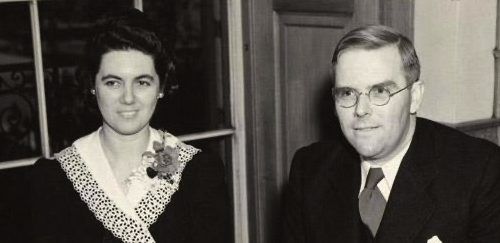
Martha and Waitstill Sharp were American Unitarians who traveled to Europe in 1939 to help refugees from Nazi persecution. Thinking they’d be gone for only a couple of months, they left their young children with church friends. The human suffering in Europe was so vast and severe that they didn’t return for two years.
Waitstill Sharp was born in Boston in 1902, a descendant of one of the first European settlers in the Massachusetts Bay. He attended Boston University and Harvard Law school. After graduating, he married Martha Ingham Dickie, the daughter of British immigrants. Martha was a social worker and peace activist who worked at Hull House, the famous Chicago facility serving newly arrived immigrants. After they married, Waitstill was ordained a Unitarian minister and he became the pastor of the Unitarian Church in Wellesley, Massachusetts. During this time, Martha attended Radcliffe College, where she earned an MA in literature. They had two children, Hastings and Martha.
In 1939, Waitstill got a call from Rev Everett Baker, president of the Unitarian Association. Knowing of the Sharps’ commitment to human rights, he asked if the couple would be interested in traveling to Czechoslovakia to help refugees from German persecution. Rev. Baker described the mission as the Unitarian Church’s “first intervention against evil overseas.”
Rev. Baker did not mince words. He told the Sharps the truth: their mission would be fraught with danger, and if they were discovered by the Germans, they would be imprisoned or killed. Seventeen other church members had already declined. Despite having two small children ages seven and two, Waistill and Martha immediately said yes. They expected to be in Europe for a couple of months, until the unrest calmed down. They left their children with friends from church and boarded a ship to Europe, arriving in Prague in February 1939.
As the Germans marched into Prague, the Sharps were warned that they should leave the country for their own safety. With a human rights disaster taking place right before their eyes, they refused to leave. They worked closely with a Quaker relief organization to lobby immigration officials in Great Britain and other countries to accept refugees. Martha herself took 35 refugees, many of them children, to England, organizing an early version of the Kindertransport. In August, Martha was forced to stop transporting refugees after a warrant was issued for her arrest.
After six months in Prague, Martha and Waitstill went to France in the spring of 1940, but when the country surrendered to Germany the Sharps traveled to Portugal, a neutral country, where they set up a base of rescue operations. Traveling clandestinely between Lisbon and Southern France, the Sharps distributed food and relief money to refugees. They organized transports that saved dozens of Jewish children as well as prominent Jewish cultural figures such as influential novelist and playwright Lion Feuchtwanger. While Waitstill worked from Portugal, Martha spent much of her time in Marseilles, at that time still unoccupied by Germany. In France, Martha distributed safe milk to French children, and battled government bureaucracy to obtain exit visas and travel permits for 29 Jewish children and 10 adults. Once she had the documents in order, she took some members of the group to Portugal, and arranged for the others to meet them there soon after.
Martha and Waitstill Sharp returned to America in December 1940, having been away from their children for nearly two years. In 1943 Martha founded “Children to Palestine” and worked with the Jewish women’s organization Hadassah to bring orphaned Jewish youth from Europe to Palestine. She returned to Lisbon in 1944, where she negotiated the release of Spanish Republican political prisoners. In that year, Waitstill was appointed to a United Nations position in Cairo while Martha continued her work with refugees in Europe. Sadly, after spending so much time apart in the 1940’s and early ’50’s, the Sharps divorced in 1954 and each eventually remarried.
In 2006, Martha and Waitstill Sharp were posthumously honored by Holocaust Memorial Yad Vashem as Righteous Among the Nations for their courage and “meritorious assistance to Jewish fugitives of Nazi terror.” They were two of only five Americans to receive the designation. At the ceremony, one of the Jews they’d saved, Eva Feigl, gave an emotional speech about how much Martha Sharp meant to her.
The Sharps are the subject of a book and a curriculum featured at the United States Holocaust Museum. Documentarian Ken Burns teamed up with the Sharps’ grandson Artemis Joukowsky, to produce “Defying the Nazis,” a film about the heroic Unitarian couple.
For traveling far from home to save the lives of strangers, at great risk to themselves, we honor Martha and Waitstill Sharp as this week’s Thursday Heroes.
Get the best of Accidental Talmudist in your inbox: sign up for our weekly newsletter.